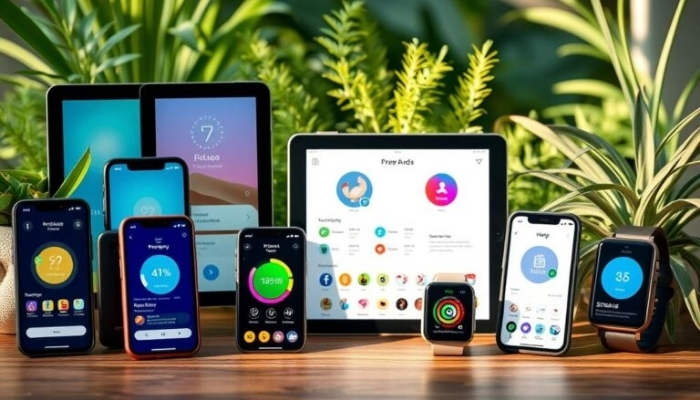In the growing digital health universe , patient health apps have become indispensable tools for those seeking smarter, more autonomous and personalized care. In times of rapid technological advancement, solutions such as remote patient monitoring , telemedicine and real-time monitoring put health control in the palm of your hand. These apps have revolutionized the way we manage well-being, offering simplified access to diagnostics, medication reminders and essential clinical indicators.
By integrating artificial intelligence , big data and cloud connectivity, these applications usher in a new era of personal health management , where people can track their exams, symptoms and treatments without leaving their homes. The convenience of accessing medical advice and vital data in real time increases the efficiency of chronic disease prevention and control, as well as providing ongoing support for patients and healthcare professionals.
Another powerful differentiator is the integration with wearable devices , such as smart watches , fitness bracelets , oximeters and heart monitors , which collect biometric data 24 hours a day. This wearable technology allows a continuous reading of heart rate, oxygen saturation, sleep quality and daily steps, synchronizing this information automatically with the health application used.
What is a patient health app?
A patient health app is a digital solution designed to facilitate the control of clinical data, symptom monitoring and treatment management. It works as a personal well-being assistant, bringing together in one place all the information needed for more effective, organized care that is integrated into the patient’s routine.
These apps stand out for offering features such as medication reminders, health progress charts, integration with wearables, and direct access to virtual consultations. Connectivity with electronic medical record systems and personalized alerts ensure precision in supporting ongoing treatment.
Check out the 3 best health apps for patients
We selected the most relevant and innovative applications on the market, with features designed for different user profiles — from those looking for a healthier routine to those dealing with chronic diseases.
- My Consultations : organizes medical records, sends notifications about medications and centralizes medical appointments with an accessible interface. Play store – Apple store
- CUIDAR+ : specialized in the control of conditions such as diabetes, hypertension and asthma, with daily self-assessment resources. Play store – Apple store
- Saúde Já : aimed at public access, it allows you to schedule appointments, track vaccination records and receive test results. Play store – Apple store
Each of these apps has free versions and is compatible with Android and iOS devices, offering technical support and continuous updates.
Top Benefits of Using Health Apps for Patients
Using a health app provides not only convenience, but also digital empowerment. The patient gains autonomy over their medical journey, recording vital signs, clinical history and therapeutic interactions in an intelligent way.
Data personalization, automatic report generation, and the ability to share data with healthcare professionals increase the effectiveness of treatments. In addition, these apps promote adherence to preventive care and encourage healthy habits through smart goals and notifications.
How do health apps work for patients?
Patient health apps operate through integrated artificial intelligence systems, biometric sensors, and predictive algorithms. These systems are capable of collecting, interpreting, and storing clinical data in an automated manner, generating personalized alerts, medical reports, and recommendations based on each user’s health history. Synchronization with wearable devices and electronic medical records increases the accuracy and usability of these features.
Check out an optimized step-by-step guide on how these apps work in practice:
- Initial registration with clinical profile : the user fills in data such as age, pre-existing illnesses and medications in use.
- Setting health goals and preferences : Define what to track — like sleep, heart rate, blood sugar, or blood pressure.
- Connection with smart devices : automatic synchronization with smartwatches, oximeters or digital scales.
- Continuous monitoring and alert generation : the app processes the data received and issues notifications in real time.
- Reports and medical integration : the patient views graphs, receives guidance and can share everything with their doctor via the app.
This automated cycle makes healthcare more accessible, preventative and personalized.
The accuracy of health apps for patients
The accuracy of health apps for patients has been consolidated with the advancement of technologies such as machine learning and predictive analytics. The metrics generated, when combined with high-quality sensors, provide reliable clinical data, often superior to manual records.
However, it is essential that the user understands that these systems complement, but do not replace, specialized clinical care. Using them in conjunction with medical guidance enhances the results and increases the safety of home monitoring.
Essential precautions when using health apps for patients
Although health apps offer practicality and efficiency in monitoring health, it is essential that users adopt security measures and digital awareness when using them. Since they handle extremely sensitive information — such as diagnoses, treatments and biometric data — these apps require responsibility in the selection, use and storage of data. Digital privacy , cybersecurity and source reliability must be taken into account as a priority.
See 5 crucial practices to ensure a safe and effective experience:
- Check the credibility of the developer : choose apps validated by healthcare institutions or available in partnership with clinics or hospitals.
- Read the privacy policy carefully : make sure that your data will not be shared with third parties without consent.
- Avoid unnecessary permissions : do not allow access to the camera, microphone or location if they are not essential for the app to function.
- Use two-factor authentication : Increase account security by protecting your data with extra layers of verification.
- Update the app frequently : newer versions fix security flaws and offer new features with greater stability.
By taking these precautions, you can ensure safer browsing while remaining focused on your health with complete confidence.
Are patient health apps worth it? Final thoughts
Yes, health apps for patients represent an undeniable evolution in the way we manage our health on a daily basis. They not only offer convenience and speed, but also promote a new culture of digital self-care, with a focus on autonomy and constant monitoring.
With the expansion of telemedicine and the digitalization of clinical services, investing in a reliable health app is a strategic step for those seeking longevity, quality of life and intelligent monitoring. Using technology to benefit your body has never made so much sense.






